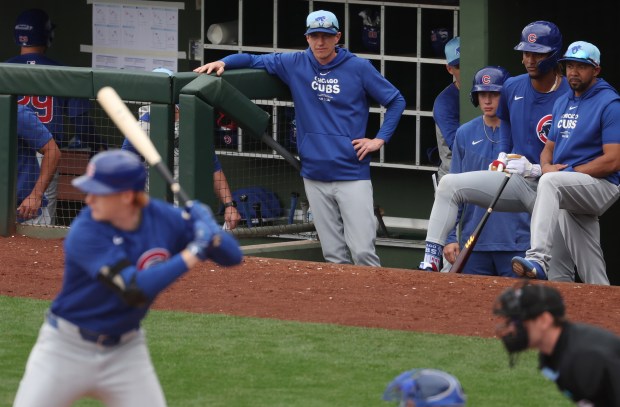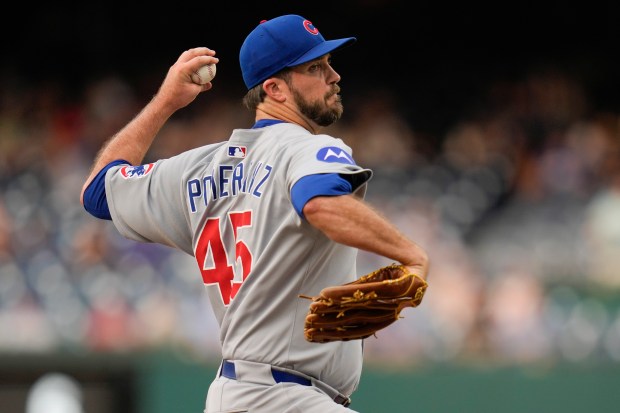During one of the last days of spring training on a cool, windy morning in Mesa, Ariz., Chicago Cubs infielders Christopher Morel and Nick Madrigal positioned themselves at third base.
Major-league coach Jonathan Mota situated in shallow left-center field with a fungo and bag of baseballs. The drill was designed for Morel and Madrigal to work on their reactions and scoop the skipping ball cleanly while putting down a tag to the base, something that will require more precision with the new obstruction rule this season.
After observing a few rounds, manager Craig Counsell approached Morel and Madrigal with feedback, touching on the obstruction rule, and then adjusted their positioning to have their backs more fully turned to Mota to make it more gamelike as a bang-bang play.
The interaction was one of many moments of Counsell getting involved during on-field work during the six-week camp, something that didn’t go unnoticed or unappreciated by players.
“It just shows how much he cares and no matter if it’s infielders, pitchers, like, you’ve seen him running bases out there for the pitchers, I mean, he’s dedicated to it,” Madrigal told the Tribune. “A lot of guys respect him for that.”
As the Cubs begin their first season with Counsell at the helm Thursday on the road against the Texas Rangers, the 53-year-old Wisconsin native already has put his imprint on the team.
“You can tell he played for so long and he’s still got that in him,” pitcher Kyle Hendricks told the Tribune. “He’s the player at heart but obviously our leader, too, at the top and he’s got a perfect mix with his personality — very calm and relaxed but super down to business, detail-oriented.
“To have him out there with us going through everything, going through the drills, it just brings a great energy, it brings the competition level up. He’s fired up out there, more of a game and season feel to it.”
Counsell and the coaching staff empowered players in camp to do what they needed to every day to get better, freedom to be self-disciplined and focus on individual improvement within the team concept. Counsell’s approach manifested earlier in his managerial career from going to NBA practices and seeing how they structured workouts to include both individual and team elements. It can be a hard balance in baseball, especially when the major-league schedule doesn’t afford much practice time once the regular season begins.
It’s part of a vision that has helped create the foundation of building the culture for the season.
“Our sport is really unique, different than other sports in that we spend a lot of time at work together without playing — there’s a lot of time to be spent in those moments and then we also have a lot of results thrown at us,” Counsell told the Tribune. “It’s always made us talk about the clubhouse more and quite frankly because the media has access to it every single day and the public gets more of a view into the room. So I don’t think (culture) is any more or less important than another sport, but I think it’s real and I know it matters to players, and if it matters to players it should matter to me.”
Counsell helped cultivate that two to three times a week in team meetings before spring home games when a veteran and younger player would be called on for each to take part in a 10-minute question-and-answer session with the rest of the clubhouse. The questions and topics ranged from lighthearted to more serious. Jordan Wicks shared how he once was a manager at a Dairy Queen. Hendricks got a kick out of Nico Hoerner asking the right-hander, who owns a career .103 average, about hitting, while Dansby Swanson questioned what stood out to him about being on winning teams.
“Doing that from the get-go really brought us together,” Patrick Wisdom told the Tribune. “Counsell teeing that up for us, having us come together in the clubhouse, expressing those stories that otherwise might not be expressed, now you have a stronger connection with someone you may not have had a connection with.”
Added Hendricks: “It was a super cool exercise because you’re going to have situations out here where you’re uncomfortable and all eyes are on you. To be comfortable with the group, it really does make a difference. There’s so much outside noise and so much pressure sometimes at this level, but at the end of the day you’ve got to believe in yourself and it’s just cool to hear no matter how old some of these guys get, they have the same thoughts, same emotions that a lot of these young guys have. It doesn’t change a whole lot.”
Multiple players mentioned how powerful David Peralta’s Q&A session was as he described his journey to the majors in which he overcame two shoulder surgeries, was released by St. Louis at 21 years old and worked at a McDonald’s to raise money to play independent ball for three years before catching on with the Arizona Diamondbacks.
After he talked, players and coaches went up to Peralta and told him they better understood why he came to the complex every day with a purpose and energy.
“The stuff Counsell does is really good because it keeps everyone together,” Peralta told the Tribune. “I really wanted to share my story because I use myself as motivation to all the guys that you can never give up on what you want. … Baseball is not forever and you never know when it’s going to be your last day so you make sure to do everything today.”
Outside the clubhouse, Counsell and the staff took a long-view approach to building the camp schedule. The Cubs had weekly individual camp days when a pitcher might want to focus on a pickoff drill or a position player spend more time on taking grounders. They also introduced pitcher and catcher video reviews each day after an outing, similar to what the Cubs do in-season. Veterans Hendricks, Jameson Taillon and Drew Smyly couldn’t recall ever having that type of in-depth video breakdown during big-league camps of during their careers.
Smyly valued going over certain at-bats or sequences to evaluate whether there was a lack of pitch execution or walking through the process that led to the pitch selection in the good or bad outcome. They embrace how it helps create accountability heading into the season.
“At this level, I think everyone should know how to handle and take care of what they need to work on to get better each individual day and if you don’t, you’re just hurting yourself,” Smyly said.
With the season beginning, Hendricks appreciates how Counsell sees players for their strengths and who they are. That helps breed confidence, and when it comes with honesty and being upfront, as Counsell has been, it can take those attributes to the next level.
“The best managers are the ones where they give you respect and you fully respect them back and it’s a two-way street. That’s clearly how it is with him,” Hendricks said. “Transparency at the end of the day brings everybody closer together with no question marks. And so throughout the course of the season, we know there’s so many ups and downs and it’s just going to keep everybody together for that much longer.”
Everything ties back to Counsell’s message of connectedness. Just as players have been learning Counsell as a person and manager, he is getting to know his team and how to put each of them in the best position to succeed. For the Cubs to get where they want to end up this season, they will rely on a largely veteran returning roster and for Counsell to optimize a group that fell painfully short of the postseason in 2023.
“One of the best things experience does is it gives you experience in those times when you’re uncomfortable and you’ve screwed up and how do you react to those times — does it paralyze you, does it set you back or does it bring out your best?” Counsell said. “That’s the great teacher of experience.”





